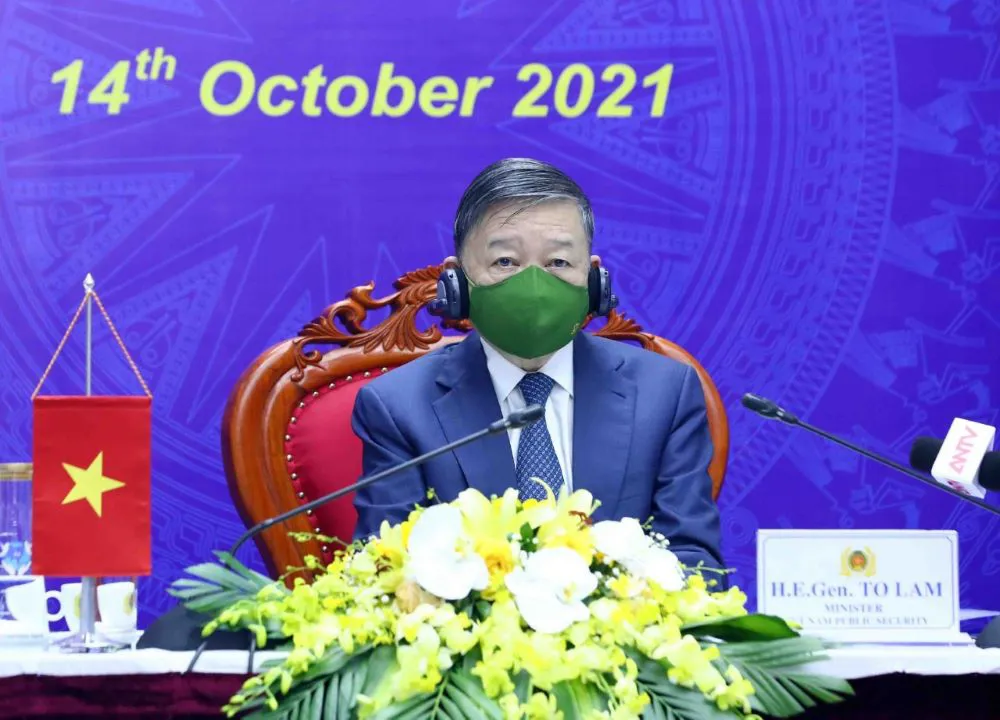Vietnam supports drug-free ASEAN
Vietnam has amended the law to join the regional efforts against drug trafficking.
Vietnam stands firm with ASEAN’s persistent stance on building a drug-free community as the member states have agreed to strive for.
| Minister of Public Security To Lam at the meeting on Oct 14. Photo: MoFA |
Vietnamese Minister of Public Security To Lam said at the 7th ASEAN Ministerial Meeting on Drug Matters (AMMD) held virtually on Oct 14 under the chair of Cambodia.
By concrete actions, Vietnam has contributed to the implementation of the ASEAN Work Plan on Securing Communities Against Illicit Drugs 2016-2025 and to combating illegal drug trafficking and production in the Golden Triangle in 2020-2022 with its national drug prevention and control program, Lam said.
To join the common efforts against drug trafficking and crimes, Vietnam has amended and supplemented Law on Drug Prevention and Control to effectively respond to changes in drug crimes; giving high priority to prevent illegal trans-border drug trafficking by land, waterway, and air; disseminating anti-drug programs; diversifying rehabilitation models for drug addicts and strictly controlling illegal drug-related activities, Lam emphasized.
For the common drive, Lam said the regional countries should strengthen “political trust” in the fight against drugs and dismantle illegal drug facilities.
Specifically, the member states need to operate online information exchange channels; share experiences in drug prevention; take raids of drug crimes along the border, and joint investigations on transnational drug crimes.
Vietnam believes that the results of the 7th AMMD will demonstrate ASEAN's high-level political commitments to drug prevention in the 2016-2025 period.
Vietnam hosted the 6th AMMD in Hanoi in 2018.
At the event, member states showed a strong commitment to implementing the ASEAN Cooperation Plan to Tackle Illicit Drug Production and Trafficking in the Golden Triangle 2020-2022.
ASEAN called on the international community to continue implementing the International Drug Control Conventions, meanwhile the regional states maintain the participation in activities of the United Nations Commission on Narcotic Drugs (CND) and related meetings; stress the importance of ASEAN dialogue partners and external partners in realizing the goal of a drug-free region.
The chairman’s statement was adopted at the meeting.
Drug trafficking in Southeast Asia
In June 2021, a new report by the United Nations Office on Drugs and Crime (UNODC) pointed to an alarming rise in the production and trafficking of synthetic drugs in East and Southeast Asia despite Covid-19.
Findings of the report showed that methamphetamine trafficking has surged in the regions with a 20% rise in the volume of methamphetamine seizures in 2020 over volumes authorities detained in 2019.
The report detailed how crime syndicates continue to find ways to exploit new and existing transit routes for illicit drugs, including via Indonesia’s Andaman Sea and Malacca Strait.
“Organized crime groups have been able to continue the expansion of the regional synthetic drug trade–in particular in the upper Mekong and the Shan State of Myanmar–by maintaining a steady supply of chemicals into production areas despite border restrictions that have impacted legitimate cross border trade”, according to UNODC Regional Representative Jeremy Douglas.
The crime groups that dominate the region have quickly adapted to and capitalized upon the pandemic, Douglas added, and continue to “aggressively push supply in a conscious effort to build the market and demand.”
Although authorities detained 71% of the approximately 170 tons of methamphetamine seized in 2020 in the lower Mekong countries of Cambodia, Laos PDR, Thailand, Myanmar, and Vietnam, the report pointed out that criminal organizations have increasingly targeted Indonesia as a trafficking route.
According to UNODC, Indonesia is now serving as a trafficking route from synthetic drugs produced in West Asia, as well in Southeast Asia’s “Golden Triangle”, en route to New Zealand, Japan, and South Korea.












